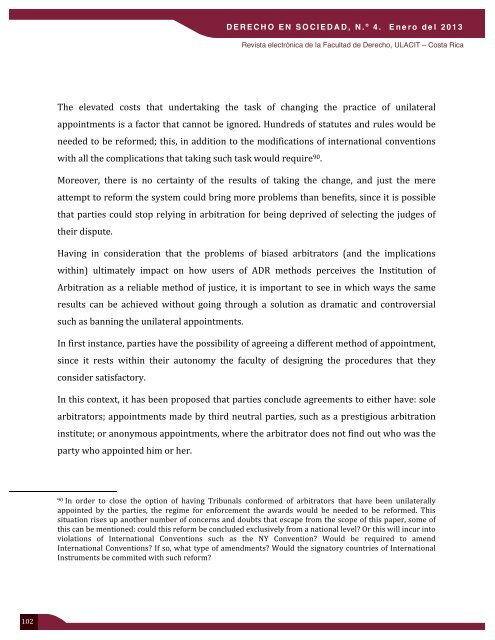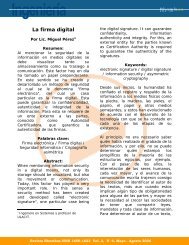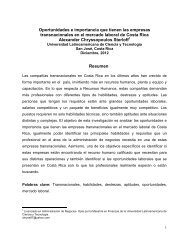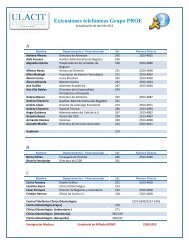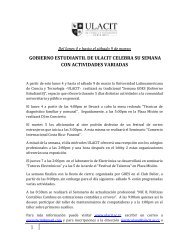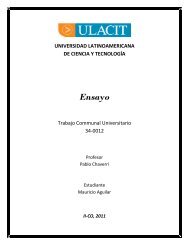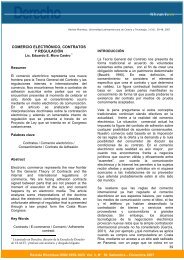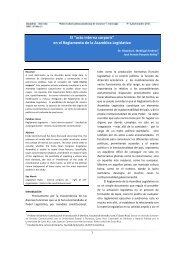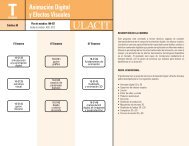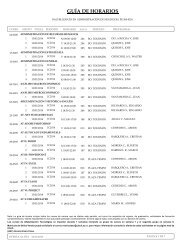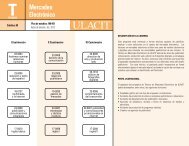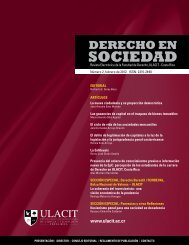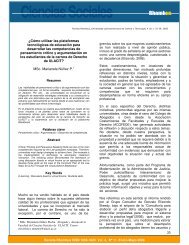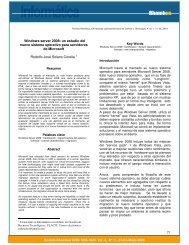IV Edición Revista Derecho en Sociedad - Ulacit
IV Edición Revista Derecho en Sociedad - Ulacit
IV Edición Revista Derecho en Sociedad - Ulacit
Create successful ePaper yourself
Turn your PDF publications into a flip-book with our unique Google optimized e-Paper software.
DERECHO EN SOCIEDAD, N. º 4 . Enero del 2013<br />
<strong>Revista</strong> electrónica de la Facultad de <strong>Derecho</strong>, ULACIT – Costa Rica<br />
The elevated costs that undertaking the task of changing the practice of unilateral <br />
appointm<strong>en</strong>ts is a factor that cannot be ignored. Hundreds of statutes and rules would be <br />
needed to be reformed; this, in addition to the modifications of international conv<strong>en</strong>tions <br />
with all the complications that taking such task would require 90 . <br />
Moreover, there is no certainty of the results of taking the change, and just the mere <br />
attempt to reform the system could bring more problems than b<strong>en</strong>efits, since it is possible <br />
that parties could stop relying in arbitration for being deprived of selecting the judges of <br />
their dispute. <br />
Having in consideration that the problems of biased arbitrators (and the implications <br />
within) ultimately impact on how users of ADR methods perceives the Institution of <br />
Arbitration as a reliable method of justice, it is important to see in which ways the same <br />
results can be achieved without going through a solution as dramatic and controversial <br />
such as banning the unilateral appointm<strong>en</strong>ts. <br />
In first instance, parties have the possibility of agreeing a differ<strong>en</strong>t method of appointm<strong>en</strong>t, <br />
since it rests within their autonomy the faculty of designing the procedures that they <br />
consider satisfactory. <br />
In this context, it has be<strong>en</strong> proposed that parties conclude agreem<strong>en</strong>ts to either have: sole <br />
arbitrators; appointm<strong>en</strong>ts made by third neutral parties, such as a prestigious arbitration <br />
institute; or anonymous appointm<strong>en</strong>ts, where the arbitrator does not find out who was the <br />
party who appointed him or her. <br />
90 In order to close the option of having Tribunals conformed of arbitrators that have be<strong>en</strong> unilaterally <br />
appointed by the parties, the regime for <strong>en</strong>forcem<strong>en</strong>t the awards would be needed to be reformed. This <br />
situation rises up another number of concerns and doubts that escape from the scope of this paper, some of <br />
this can be m<strong>en</strong>tioned: could this reform be concluded exclusively from a national level? Or this will incur into <br />
violations of International Conv<strong>en</strong>tions such as the NY Conv<strong>en</strong>tion? Would be required to am<strong>en</strong>d <br />
International Conv<strong>en</strong>tions? If so, what type of am<strong>en</strong>dm<strong>en</strong>ts? Would the signatory countries of International <br />
Instrum<strong>en</strong>ts be commited with such reform? <br />
102


